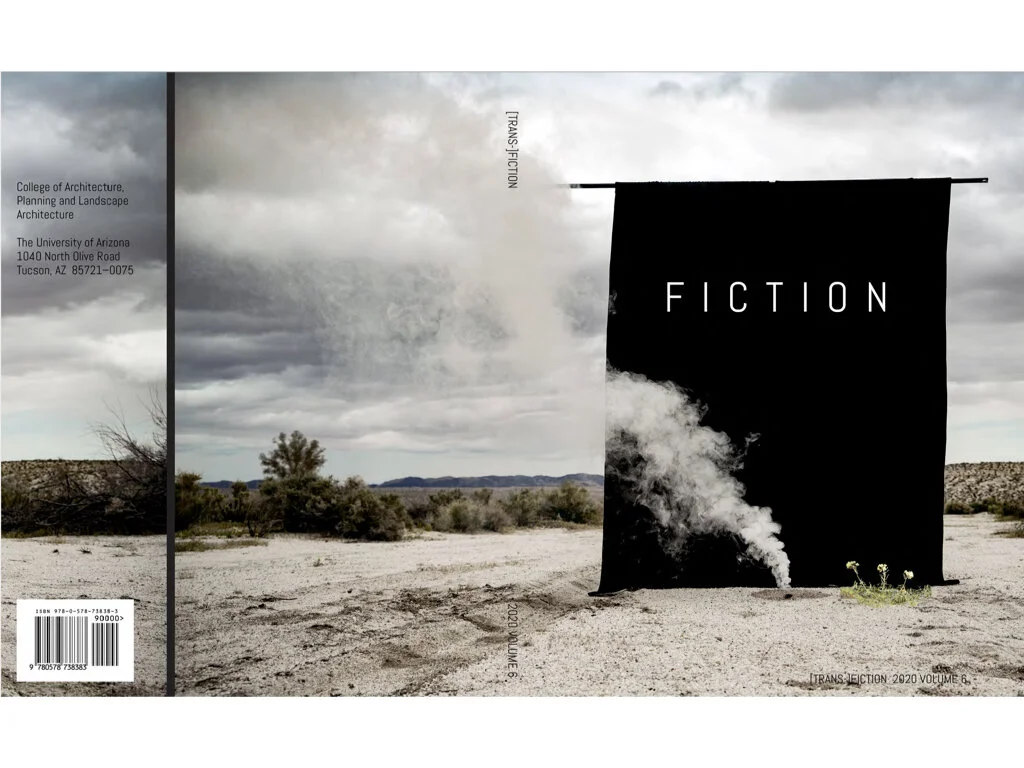[TRANS-] FICTION
Editor + Contributing Author
Spring/Summer 2020
cover image: Rebecca Webb
Architecture may be said to originate from fictitious realms; imagined forms and abstract marks of representation materialize in space and time to tell stories through the distillation of ideas, by establishing perspectives, transforming information, and mapping cultural preoccupations. In its sixth iteration, [Trans-] Journal* explores the relationship between fiction and architecture. This issue assumes an elastic definition of architecture as media that critically engages with design practice and the spatial realm. Contributors range from practicing architects and designers to educators, artists, and writers, many of whom operate across disciplinary boundaries to offer reflections on the topic. Wide-ranging perspectives provide observation and critique through narratives rooted in the design and the representation of space, which consider the human experience, occupation, and movement; speculations on future scenarios that posit real and virtual infrastructure and systems; retrospective reflections, which rely on interpretations of cultural discourse and the built environment to evaluate present conditions, offer commentary, and envisage new frameworks for our built and socio-political milieu; and abstractions that operate as analytical or generative tools, recording environmental conditions and generating new realities. Together, the fictions put forward in this volume both outline and inspire innovative methods for critique and discourse, while raising awareness of evolving social, cultural, political and atmospheric conditions, and emergent technologies related to our built environment.
*[Trans-] Journal is a non-profit academic journal established in 2014 at the College of Architecture, Planning and Landscape Architecture at The University of Arizona. [Trans-] Journal brings together various media to explore topics across architecture and design, seeking understanding beyond a facile condition and through the intricacies that derive from interrogating origins and implications.

![[TRANS-] FICTION VOL 6 - 2020 (final spreads) (r)_Page_04.jpg](https://images.squarespace-cdn.com/content/v1/55d5813be4b06c5ffbba4a33/1611125477283-OXWS0NZCD3N2SYYOW3L1/%5BTRANS-%5D+FICTION+VOL+6+-+2020+%28final+spreads%29+%28r%29_Page_04.jpg)
![[TRANS-] FICTION VOL 6 - 2020 (final spreads) (r)_Page_05.jpg](https://images.squarespace-cdn.com/content/v1/55d5813be4b06c5ffbba4a33/1611125477447-CTO4HP14C8CAV81K3M4M/%5BTRANS-%5D+FICTION+VOL+6+-+2020+%28final+spreads%29+%28r%29_Page_05.jpg)
![[TRANS-] FICTION VOL 6 - 2020 (final spreads) (r)_Page_61.jpg](https://images.squarespace-cdn.com/content/v1/55d5813be4b06c5ffbba4a33/1611125585271-SLXD8RUCDAL4G6JZQ8BP/%5BTRANS-%5D+FICTION+VOL+6+-+2020+%28final+spreads%29+%28r%29_Page_61.jpg)
![[TRANS-] FICTION VOL 6 - 2020 (final spreads) (r)_Page_62.jpg](https://images.squarespace-cdn.com/content/v1/55d5813be4b06c5ffbba4a33/1611125586068-8R89E5BIPJMQ2OBPL6I4/%5BTRANS-%5D+FICTION+VOL+6+-+2020+%28final+spreads%29+%28r%29_Page_62.jpg)
![[TRANS-] FICTION VOL 6 - 2020 (final spreads) (r)_Page_63.jpg](https://images.squarespace-cdn.com/content/v1/55d5813be4b06c5ffbba4a33/1611125586654-JINP8RDORG1ADISJO29L/%5BTRANS-%5D+FICTION+VOL+6+-+2020+%28final+spreads%29+%28r%29_Page_63.jpg)
![[TRANS-] FICTION VOL 6 - 2020 (final spreads) (r)_Page_64.jpg](https://images.squarespace-cdn.com/content/v1/55d5813be4b06c5ffbba4a33/1611125586899-P8S36YGM7LFKJQTIXUYZ/%5BTRANS-%5D+FICTION+VOL+6+-+2020+%28final+spreads%29+%28r%29_Page_64.jpg)
![[TRANS-] FICTION VOL 6 - 2020 (final spreads) (r)_Page_65.jpg](https://images.squarespace-cdn.com/content/v1/55d5813be4b06c5ffbba4a33/1611125587746-3QWKAGMAZH4J6DFOACU6/%5BTRANS-%5D+FICTION+VOL+6+-+2020+%28final+spreads%29+%28r%29_Page_65.jpg)